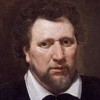Quotations about:
insult
Note not all quotations have been tagged, so Search may find additional quotes on this topic.
FLUELLEN: If the enemy is an ass and a fool and a prating coxcomb, is it meet, think you, that we should also, look you, be an ass and a fool and a prating coxcomb, in your own conscience now?
William Shakespeare (1564-1616) English dramatist and poet
Henry V, Act 4, sc. 1, l. 80ff (4.1.80-83) (1599)
(Source)
He that flings Dirt at another dirtieth himself most.
Thomas Fuller (1654-1734) English physician, preacher, aphorist, writer
Gnomologia: Adages and Proverbs, #2107 (1732)
(Source)
Men are more prone to revenge Injuries, than to requite Kindnesses.
Thomas Fuller (1654-1734) English physician, preacher, aphorist, writer
Gnomologia: Adages and Proverbs, #3389 (1732)
(Source)
DICKINSON: Mr. Jefferson, Mr. Lee, Mr. Hopkins, Dr. Franklin, why have you joined this — incendiary little man, this BOSTON radical? This demagogue, this MADMAN?
ADAMS: Are you calling me a madman, you, you — you FRIBBLE!
FRANKLIN: Easy, John.
ADAMS: You cool, considerate men — you hang to the rear on every issue so that if we should go under, you’ll still remain afloat!
DICKINSON: Are you calling me a coward?
ADAMS: Yes — coward!
DICKINSON: Madman!
ADAMS: Landlord!
DICKINSON: LAWYER!
[A brawl breaks out]
SHYLOCK: He hath disgraced me and
hindered me half a million, laughed at my losses,
mocked at my gains, scorned my nation, thwarted
my bargains, cooled my friends, heated mine enemies —
and what’s his reason? I am a Jew. Hath not
a Jew eyes? Hath not a Jew hands, organs, dimensions,
senses, affections, passions? Fed with the
same food, hurt with the same weapons, subject to
the same diseases, healed by the same means,
warmed and cooled by the same winter and summer
as a Christian is? If you prick us, do we not
bleed? If you tickle us, do we not laugh? If you
poison us, do we not die? And if you wrong us, shall
we not revenge? If we are like you in the rest, we will
resemble you in that. If a Jew wrong a Christian,
what is his humility? Revenge. If a Christian wrong
a Jew, what should his sufferance be by Christian
example? Why, revenge! The villainy you teach me I
will execute, and it shall go hard but I will better the
instruction.William Shakespeare (1564-1616) English dramatist and poet
Merchant of Venice, Act 3, sc. 1, l. 53ff (3.1.53-72) (1597)
(Source)
Men hate more steadily than they love; and if I have said something to hurt a man once, I shall not get the better of this by saying many things to please him.
Samuel Johnson (1709-1784) English writer, lexicographer, critic
In James Boswell, Life of Samuel Johnson, “September 15, 1777” (1791)
(Source)
It is always easier to hear an insult and not retaliate than have the courage to fight back against someone stronger than yourself; we can always say we’re not hurt by the stones others throw at us, and it’s only at night — when we’re alone and our wife or our husband or our school friend is asleep — that we can silently grieve over our own cowardice.
“Thalaba,” Mr. Southey’s second poem, is written in open defiance of precedent and poetry. Mr. S. wished to produce something novel, and succeeded to a miracle. “Joan of Arc” was marvelous enough, but “Thalaba” was one of those poems “which,” in the words of Porson, “will be read when Homer and Virgil are forgotten, but — not till then.”
George Gordon, Lord Byron (1788-1824) English poet
“English Bards and Scotch Reviewers,” footnote to l. 205 (1809)
(Source)
When one of his earlier works was harshly criticized in the Edinburgh Review, Byron wrote this poem satirizing such critics (and the poetry they like). He refers to Robert Southey's "Thalaba," bringing in a phrase used by classical scholar Richard Porson to refer to Southey's poem "Madoc". Except ...
... Porson doesn't include the "but not till then" phrase in his original comment. A man of subtle but biting humor, it seems likely he intended that as a subversive but deniable reading of "when Homer and Virgil are forgotten". Believing that, multiple writers of the time in turn criticized Byron for crudely spelling out Porson's bon mot (examples: Timbs (1862), Powell/Rogers (1903)).
Sir, calumnies are answer’d best with silence.
Our credulity is greatest concerning the things we know least about. And since we know least about ourselves, we are ready to believe all that is said about us. Hence the mysterious power of both flattery and calumny.
Eric Hoffer (1902-1983) American writer, philosopher, longshoreman
The Passionate State of Mind, Aphorism 128 (1955)
(Source)
OSWALD: Why dost thou use me thus? I know thee not.
KENT: Fellow, I know thee.
OSWALD: What dost thou know me for?
KENT: A knave; a rascal; an eater of broken meats; a base, proud, shallow, beggarly, three-suited, hundred-pound, filthy, worsted-stocking knave; a lily-livered, action-taking whoreson, glass-gazing, superserviceable, finical rogue; one-trunk-inheriting slave; one that wouldst be a bawd, in way of good service, and art nothing but the composition of a knave, beggar, coward, pander, and the son and heir of a mongrel bitch: one whom I will beat into clamorous whining, if thou deniest the least syllable of thy addition.
William Shakespeare (1564-1616) English dramatist and poet
King Lear, Act 2, sc. 2, l. 11ff (2.2.11-24) (1606)
(Source)
Many can bear Adversity but few Contempt.
Thomas Fuller (1654-1734) English physician, preacher, aphorist, writer
Gnomologia: Adages and Proverbs, #3340 (1732)
(Source)
HAMLET: Be thou as chaste as ice, as pure as snow, thou shalt not escape calumny.
William Shakespeare (1564-1616) English dramatist and poet
Hamlet, Act 3, sc. 1, l. 147ff (3.1.147-148) (c. 1600)
(Source)
Elisha left Jericho to go to Bethel, and on the way some boys came out of a town and made fun of him. “Get out of here, baldy!” they shouted. Elisha turned around, glared at them, and cursed them in the name of the Lord. Then two she-bears came out of the woods and tore forty-two of the boys to pieces.
The Bible (The Old Testament) (14th - 2nd C BC) Judeo-Christian sacred scripture [Tanakh, Hebrew Bible], incl. the Apocrypha (Deuterocanonicals)
2 Kings 2:23-24 [GNT (1976)]
(Source)
Alternate translations:
And he went up from thence unto Bethel: and as he was going up by the way, there came forth little children out of the city, and mocked him, and said unto him, Go up, thou bald head; go up, thou bald head. And he turned back, and looked on them, and cursed them in the name of the Lord. And there came forth two she bears out of the wood, and tare forty and two children of them.
[KJV (1611)]
From there he went up to Bethel, and while he was on the road up, some small boys came out of the town and jeered at him. ‘Go up, baldhead!’ they shouted ‘Go up, baldhead!’ He turned round and looked at them; and he cursed them in the name of Yahweh. And two she-bears came out of the wood and savaged forty-two of the boys.
[JB (1966)]
He went up from there to Bethel, and while he was going up on the way, some small boys came out of the city and jeered at him, saying, “Go away, baldhead! Go away, baldhead!” When he turned around and saw them, he cursed them in the name of the Lord. Then two she-bears came out of the woods and mauled forty-two of the boys.
[NRSV (1989 ed.)]
From there he went up to Bethel. As he was going up the road, some little boys came out of the town and jeered at him, saying, “Go away, baldhead! Go away, baldhead!” He turned around and looked at them and cursed them in the name of GOD. Thereupon, two she-bears came out of the woods and mangled forty-two of the children.
[RJPS (2006)]
From there Elisha went up to Bethel. As he was walking along the road, some youths came out of the town and jeered at him. "Go on up, you baldhead!" they said. "Go on up, you baldhead!" He turned around, looked at them and called down a curse on them in the name of the LORD. Then two bears came out of the woods and mauled forty-two of the youths.
[NIV (2011 ed.)]
The stroke of the whip maketh marks in the flesh: but the stroke of the tongue breaketh the bones. Many have fallen by the edge of the sword: but not so many as have fallen by the tongue.
The Bible (The Old Testament) (14th - 2nd C BC) Judeo-Christian sacred scripture [Tanakh, Hebrew Bible], incl. the Apocrypha (Deuterocanonicals)
Sirach (Ecclesiasticus) 28:17-18 [KJV (1611)]
(Source)
Alternate translations:
The stroke of a whip maketh a blue mark: but the stroke of the tongue will break the bones. Many have fallen by the edge of the sword, but not so many as have perished by their own tongue.
[DRA (1899); 28:21-22]
A stroke of the whip raises a weal, but a stroke of the tongue breaks bones. Many have fallen by the edge of the sword, but many more have fallen by the tongue.
[JB (1966)]
A whip can raise a welt, but a vicious tongue can break bones. More people have died as a result of loose talk than were ever killed by swords.
[GNT (1976)]
The blow of a whip raises a welt, but a blow of the tongue crushes the bones. Many have fallen by the edge of the sword, but not as many as have fallen because of the tongue.
[NRSV (1989 ed.)]
The idea that any kind of free society can be constructed in which people will never be offended or insulted is absurd. So too is the notion that people should have the right to call on the law to defend them against being offended or insulted. A fundamental decision needs to be made: do we want to live in a free society or not? Democracy is not a tea party where people sit around making polite conversation. In democracies people get extremely upset with each other. They argue vehemently against each other’s positions. (But they don’t shoot.)
Salman Rushdie (b. 1947) Indian novelist
“Do we have to fight the battle for the Enlightenment all over again?” The Independent (22 Jan 2005)
(Source)
A strange and vanity-devoured, detestable woman! I do not believe I could ever learn to like her except on a raft at sea with no other provisions in sight.
Mark Twain (1835-1910) American writer [pseud. of Samuel Clemens]
The Autobiography of Mark Twain, Vol. 3, 3 July 1908 (2010)
(Source)
SHYLOCK: Thou call’dst me dog before thou hadst a cause,
But since I am a dog, beware my fangs.William Shakespeare (1564-1616) English dramatist and poet
Merchant of Venice, Act 3, sc. 3, l. 7ff (3.3.7-8) (1597)
(Source)
I’ve had a perfectly wonderful evening. But this wasn’t it.
Groucho Marx (1890-1977) American comedian [b. Julius Henry Marx]
(Spurious)
Groucho (in 1962) denied ever using the phrase (attributed to him as early as 1941). The earliest, somewhat dubious instance of it found is in 1936, attributed to comedian Hugh Hubert. More here.
ARISTOCRAT: Who is that ugly woman who just came in?
LORD NORTH: Oh, that is my wife.
ARISTOCRAT: Sir, I beg your pardon. I do not mean her. I mean that shocking monster who is along with her.
LORD NORTH: That is my daughter.Frederick North (1732-1792) British Prime Minister (1770-82) [Lord North]
(Attributed)
To limit the press is to insult the nation; to prohibit the reading of certain books is to declare the inhabitants to be either fools or slaves.
Claude Adrien Helvétius (1715-1771) French philosopher
A Treatise on Man: His Intellectual Faculties and His Education [De l’homme] (1772)




















